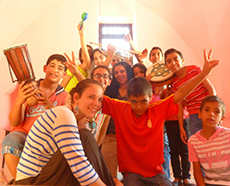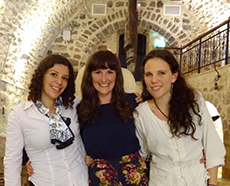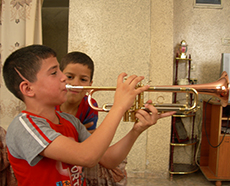Camellia Boutros, the winner of the Nathan Foley-Mendelssohn Travel Scholarship, reports on her trip to Palestine
I traveled to the West Bank in Palestine last summer; more specifically, I was in Nablus, a city to the north of Jerusalem consisting of around 120,000 people. My flight there coincided with an outbreak of fighting in the war between Israel and Gaza, but luckily none of the conflict touched the region I was in. So with very few interruptions, I went on to volunteer as a music teacher for six weeks with an organization called Music Harvest. The program I was in takes music teachers from all around the world and places them in local schools and community centers to teach kids ages eight to 18 years old. We taught a lot of basic rhythms and harmonies, but also played with instruments and learned both traditional and Western music.
Though Nablus was our base, I also had the chance to visit Jerusalem, Ramallah, Jericho, Hebron, Bethlehem, and even Tel Aviv. Every city was completely different from all the others, which was kind of shocking, because we never had to travel farther than three hours in any direction. It’s probably because these cities are some of the oldest on the planet; Jericho is at least 10,000 years old.
But most important than the geography and history, for me at least, was the culture. Palestinian culture is definitely the warmest I’ve ever encountered. I would go back in a heartbeat. Total strangers would invite us in for coffee all the time, or if take time out of their day to show us how to get somewhere if we were lost. Once, my friend took the wrong bus and ended up in a city hours away from where she needed to be. She had nothing on her but her passport and her wallet, and couldn’t go back until the next day. But a family offered to take her in, and they ended up feeding her, giving her a room to stay in, and even giving her fresh clothes in the morning before sending her off in the right direction.
I have always had an interest in Palestine because I am half Palestinian. However, I knew that if I visited I would have to travel alone, and I wanted to have a purpose there so that I could explore and interact with the people on a more personal level. I tried to figure out what I had to offer a society I had never visited before, and music was high on the list because I had been playing and teaching piano, trumpet, and guitar for years. So I searched for music volunteer programs in Palestine, and actually came up with several different organizations (for such a small country, Palestine is home to a surprisingly large number of NGOs). I applied, got in, and started looking for a plane ticket.
Which led me to apply for the Nathan Foley-Mendelssohn Travel Scholarship; Music Harvest does not charge its volunteers, but it’s also not well-funded enough to pay for all of our plane tickets, especially for those of us coming from overseas. With support from the travel scholarship, the expenses of the trip were eliminated, and I was able to focus on teaching and learning about Palestinian culture.
The great thing about Music Harvest itself is that it earnestly promotes cultural exchange, as opposed to this idea that one group of people is purely receiving from another that is purely giving. The program was free for the volunteers and students alike, and of course the volunteers were not paid, but in exchange for our service we were given regular Arabic lessons and had access to guides and information so we could better interact with the local culture. And as Western music volunteers, we also received music lessons on the traditional music of Palestine! I ended up bringing home an oud (a Middle Eastern instrument that resembles a fretless guitar), and Palestinian music has definitely made its way into my compositions.
After spending six weeks in Palestine, I definitely feel like I gained a holistic (though still introductory) knowledge of life there. I learned the language, I learned about social customs, the traditions (especially the music), the general economy of the region, the effects of the Israeli occupation on the average civilian in Palestine, and, as teacher, I learned a lot about working with kids.
Teaching kids is difficult in general, but the language barrier made things even harder. That being said, music was probably the easiest thing I could have been asked to teach in a foreign country. It’s just so intuitive; kids can understand that you want them to keep a beat or clap a rhythm without exchanging a word in any language. Music is just basic communication, and that only really clicked with me when I had to rely on music making in order to make myself understood to my students.
There was this kid who sold coffee in the market square every afternoon. He wasn’t even a student of mine, but I usually carried instruments with me as I walked past the square, and every time he saw me he would come up and play with the drums. This became our routine: I took a break and bought a coffee, he took a break and played some music. Well, about a week before I was supposed to go back home, I had this really horrible day where nothing seemed to happen as it should. The water wasn’t working in our home. Our scheduled guest didn’t come in to help us teach, meaning we had no lesson plan for our students, and they went wild. Literally screaming and running around the classroom while banging on drums and desks. There was traffic and a class got cancelled, stuff like that just kept happening all day. I finally got a break, bought a cappuccino from the only European café in town, and sat down in the square to enjoy it. But someone knocked into me and I watch, horrified, as the cappuccino spiraled out of my grip and burst on the floor like a water balloon. It was like the icing on a really nasty cake. I just sat for a second, totally defeated. But then someone tapped my shoulder, and it was the coffee boy, handing me a cup of Turkish coffee. I took it, but he didn’t even charge. Just tapped one of my drums, smiled, and walked away. In retrospect, it’s one of my favorite memories, because in five seconds he totally turned my day around.
Camellia Boutros blog: http://musetripper.com/




